DUBAI: Saudi-Malaysia bilateral relations have experienced “phenomenal advance” over the past decade in terms of trade and investment, resulting in a “win-win” for both countries, Anwar Ibrahim, the prime minister of Malaysia, has said.
Speaking to Katie Jensen, host of the Arab News current affairs program “Frankly Speaking,” during a visit to Riyadh for a special meeting of the World Economic Forum last week, Anwar said he would like to see accelerated deepening of ties.
Even compared with six months ago, when he attended the Gulf Cooperation Council’s joint summit with the Association of Southeast Asian Nations in Riyadh in October, Anwar said the “two-way traffic” of investment had advanced.
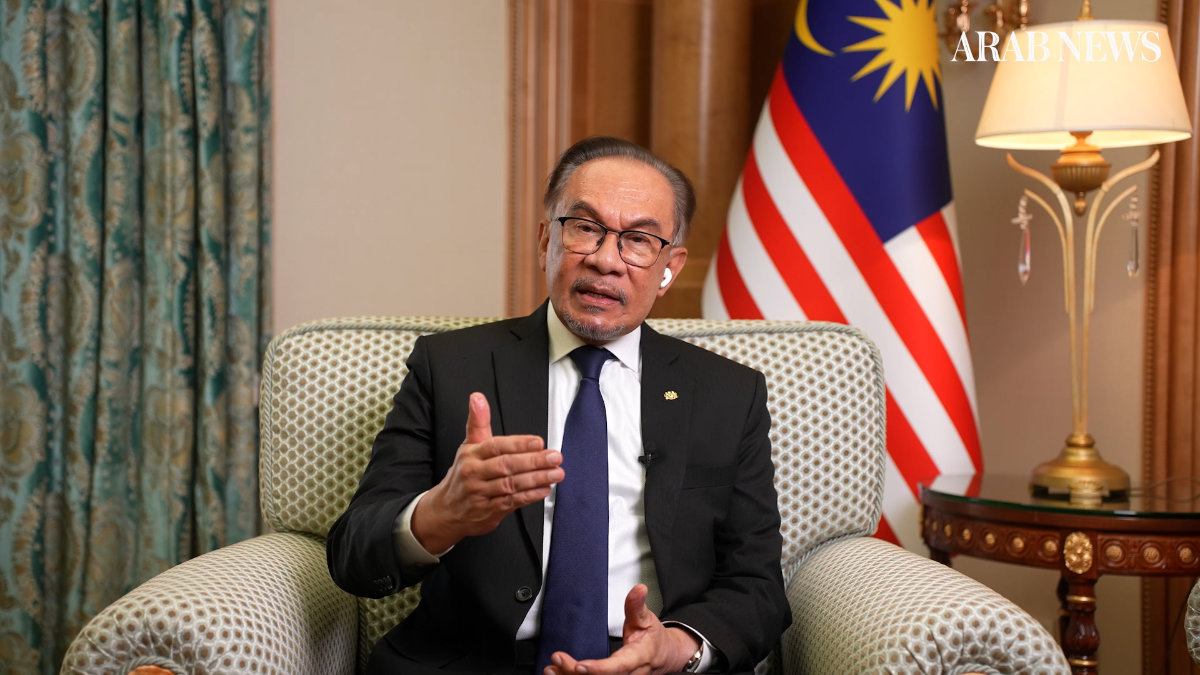
Prime Minister Anwar Ibrahim said he would like to see accelerated deepening of ties between Saudi Arabia and Malaysia. (AN photo)
“It was a phenomenal advance and improvement in terms of trade, investments, not only in oil and gas by Aramco, but also by leading Saudi companies,” he said in a wide-ranging interview covering development, diplomacy and the fight against corruption.
“A lot of Malaysian companies, too, are involved here, of course, in a smaller scale, in many of NEOM’s and in some of the energy transition programs. And I’m pleased that this two-way traffic is advancing.
“In my discussions with the crown prince, I would like to urge that this be further accelerated because that would be a win-win for both countries.”
Anwar’s personal friendship with Saudi Crown Prince and Prime Minister Mohammed bin Salman is part of the reason for this burgeoning bilateral relationship, which has in turn bolstered the GCC-ASEAN partnership.
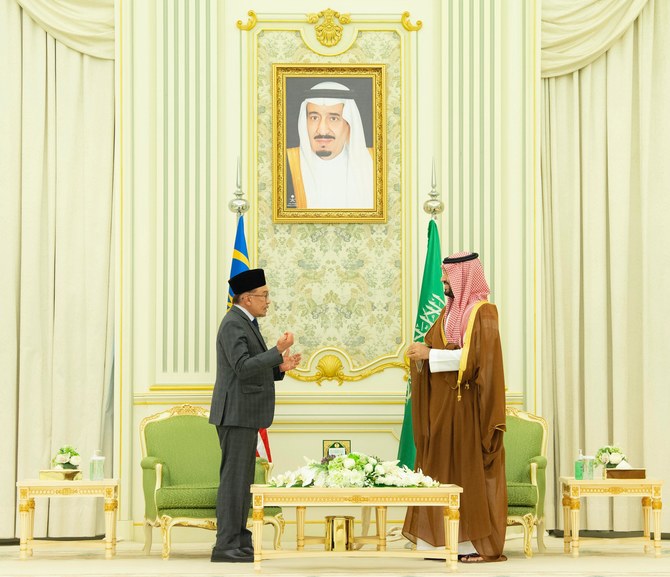
Saudi Crown Prince Mohammed bin Salman receives Malaysian Prime Minister Anwar Ibrahim in Riyadh on October 22, 2023. (SPA/File)
“I must say that I’m fortunate because Crown Prince Mohammed bin Salman considered me as a friend,” said Anwar, who met the crown prince during his visit for the World Economic Forum.
“We do exchange notes from time to time and he personally requested me to be present, and gives me a good opportunity to express some of the concerns and more so to be focused on economic development, on the relationships that it covers, particularly in terms of trade and investments.
“And I think he’s very forthcoming, he’s serious, he’s very determined and he’s tough. And that is to me a credit, particularly when it comes to bilateral relations. Enough rhetoric, enough pious platitudes. We want action and effective economic programs among our countries and the region, which include, therefore, ASEAN and the GCC.”
ALSO READ: Malaysian PM condemns West’s ‘sheer hypocrisy’ over Gaza war
Saudi Arabia and Malaysia also share much in common in terms of their respective economic development programs, which Anwar says are closely aligned.
While the Kingdom recently celebrated the eighth anniversary of its social reform and economic diversification agenda — Vision 2030 — Malaysia is likewise making strides with its own development plan — the Madani economic framework.
Launched in July 2023, less than a year after Anwar became prime minister, the framework aims to position Malaysia among the world’s 30 largest economies, its top 25 least corrupt countries according to the Corruptions Perceptions Index, top 12 in the Global Competitiveness Index and top 25 in the Human Development Index.
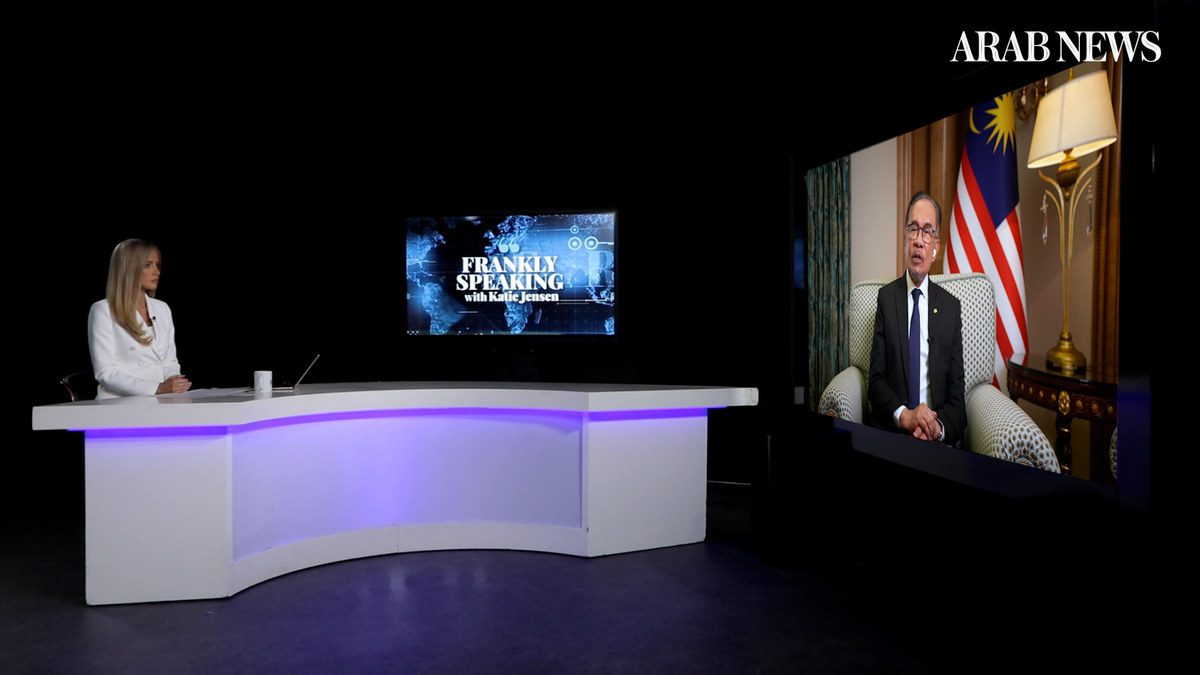
Speaking to Katie Jensen, host of the Arab News current affairs program “Frankly Speaking,” Malaysian Prime Minister Anwar Ibrahim said he would like the deepening of Saudi-Malaysian ties accelerated "because that would be a win-win for both countries.” (AN photo)
Malaysia also aims to raise its female labor force participation rate to 60 percent and lower its fiscal deficit to 3 percent and lower. To succeed in this reform agenda, Anwar intends to weed out corruption, implement good governance, boost foreign and domestic direct investment, and raise wages.
“I studied Vision 2030 extensively,” said Anwar. “And during the session we had during the World Economic Forum, we had an opportunity to engage with Crown Prince Mohammed bin Salman for an hour asking questions on how he then sees this vision coming.”
He added: “We are now moving ahead to deal with issues that would affect the future of the world, particularly the emerging economies … dealing with energy, with digital, with technology, with quality education, with good public health service, with AI.
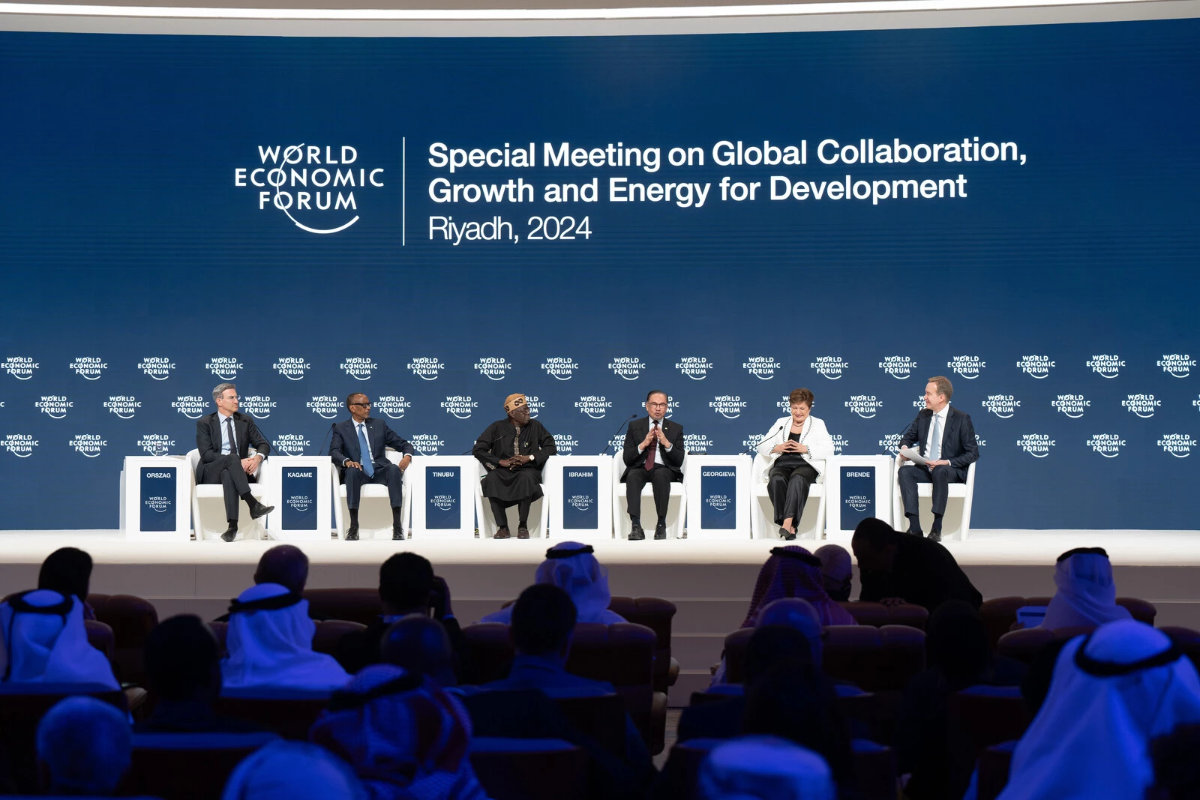
Malaysian Prime Minister Anwar Ibrahim speaks during panel discussion of the World Economic Forum meeting in Riyadh last week. (X: @WEF)
“And I think this is the direction which is consistent with the Madani, because we also talk about civilization and values and integrity and, more importantly, the issue of good governance.”
A shared economic trajectory is not the only thing Saudi Arabia and Malaysia have in common. Both nations have also pursued their own independent foreign policy, without submitting to the demands of powerful allies or choosing sides in superpower rivalries.
“Firstly, we are not tied to this xenophobic view of viewing China in a negative sense,” said Anwar. “As a neighbor, we have not encountered problems with them.
“Of course, there are teething issues which we do encounter with all our neighbors and countries, but we maintain excellent relations, which would enormously benefit Malaysia as an emerging economy: Investments, trade and even cultural exchanges.
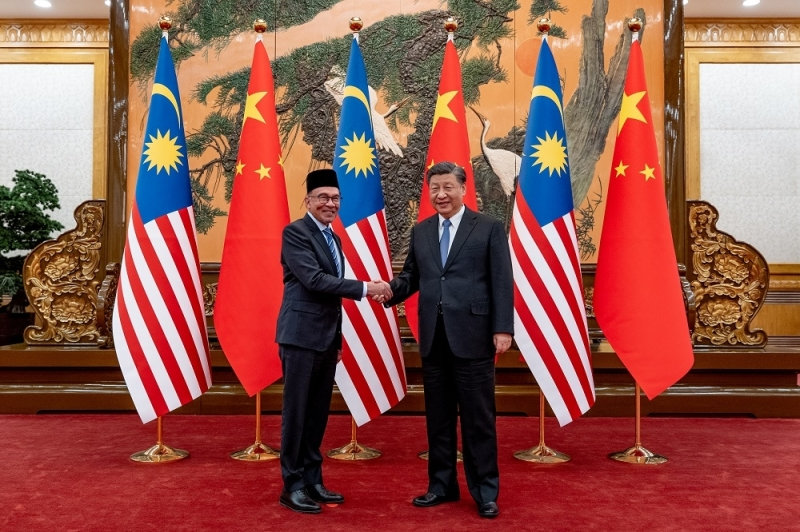
Malaysian Prime Minister Anwar Ibrahim (left) meets with Chinese President Xi Jinping in Beijing on March 31, 2023. (PMO photo)
“And we also have a very strong presence of the ethnic Chinese in Malaysia. And I think to deny them a right of engaging would be futile.
“At the same time, as I have said earlier, cumulatively, the US remains the most important trading partner. And we are comfortable with it. We have benefited from its training, the technology transfer and also the workforce.
“Now there’s a continued presence of European countries, including Germany. And I think, why can’t we be just friends and engage with everybody? And those who are having problems should not impose and dictate their policies to the smaller economies, because we cannot afford to have that.
“There’s no reason whatsoever for us to be involved in that sort of a trade war, or bifurcation or tense relations between these countries.”
On the domestic front, Anwar has been true to his word on combating corruption. The Malaysian Anti-Corruption Commission has confirmed it is investigating former Prime Minister Mahathir Mohamad in connection with a case involving his sons, Mirzan Mahathir and Mokhzani Mahathir, who have been ordered to declare their assets.
Mahathir is a vocal critic of Anwar, who served as his deputy during the 1990s before being jailed. Anwar has denied accusations of using his anti-corruption drive to settle an old political score.
“We cannot deny the fact that any effective measure to combat corruption would invite some negative political remarks,” said Anwar.
“So, are we suggesting that effective anti-corruption moves should avoid dealing with past corrupt leaders? Of course, the answer is no, because then the public would think that if you belong in a certain level, then you should be safe, excluded from these operations.
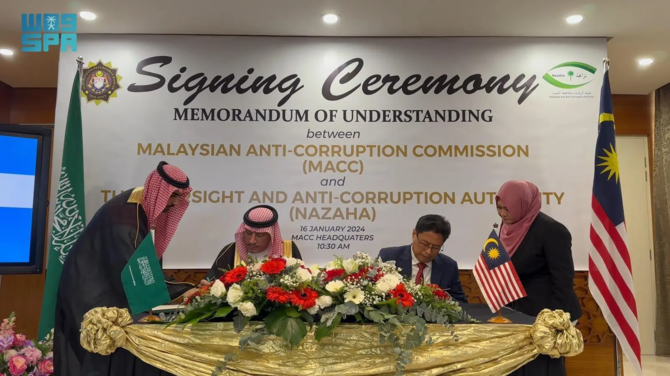
Saudi Oversight and Anti-Corruption Authority and Malaysian Anti-Corruption Commission signed an agreement on combating cross-border corruption. (SPA)
“So, I leave it entirely to the Anti-Corruption Commission. They do not consult me. My instructions are clear: We must stop the rot. It does not matter what the position, present or past. If you find basic reasons to suggest that investigations must be conducted fairly and professionally, please do so, because you cannot be selective, whether they are in the government or opposition, whether present leaders or past leaders.
“Otherwise, leaders like me will take the opportunity. You amass wealth as much as possible, quietly, and then later I’ll be safe because past leaders should not be touched. I think this is not the position that we take.
“I started this administration with clear calls. Good governance to rid the country of the scourge of corruption, which has led to so much waste. The endemic corruption is a scourge because it has condemned the society and the poor have suffered due to this. And many of our programs have been somewhat scuttled.
“So, we will proceed regardless. And it does not bother me in terms of the political reaction, because the Anti-Corruption Commission must remain independent and professional.”





























